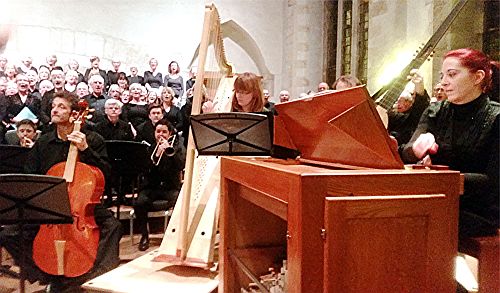 United Kingdom Monteverdi: Elizabeth Drury and Louise Prickett sopranos), James Way and Peter Wilman (tenors), James Armitage (counter tenor), Julian Rippon and Matthew Cann (baritones), Dartington Community Choir, The English Cornett & Sackbut Ensemble, Members of Devon Baroque / Jonathan Watts (conductor) The Great Hall, Dartington, 14.12.2014 (PRB)
United Kingdom Monteverdi: Elizabeth Drury and Louise Prickett sopranos), James Way and Peter Wilman (tenors), James Armitage (counter tenor), Julian Rippon and Matthew Cann (baritones), Dartington Community Choir, The English Cornett & Sackbut Ensemble, Members of Devon Baroque / Jonathan Watts (conductor) The Great Hall, Dartington, 14.12.2014 (PRB)

Claudio Giovanni Antonio Monteverdi Vespers of 1610
In 1942 when Imogen Holst, only child of composer Gustav Holst and herself a composer and conductor, was invited to join the staff at the former Dartington College of Arts, not far from the ancient Devon market-town of Totnes in South West England, to train young music students, she established both an orchestra and a choir to which all the community was welcome. Dartington College of Arts continued this tradition with local participation in the college choir until 1982 when, in the autumn of that year, a new choir was formed, known as the Dartington Community Choir, and which is still privileged to hold concerts in the magnificent 15th century Great Hall on the 1200 acre (485 hectare) estate. Its present conductor, Baroque-specialist, Jonathan Watts took over as musical director and conductor in September 2009, and the choir now numbers some 170 singers.
There were no gondolas moored outside, nor a pigeon in sight as you crossed the open courtyard. But once Dartington Community Choir, the English Cornett & Sackbut Ensemble and members of Devon Baroque struck up the opening bars, the magnificent Great Hall was magically transformed into the even more illustrious setting of St Mark’s Venice and, as if by some kind of musical time-warp, taken all the way back to 1610 – and where some good use of antiphonal and spatial effects, with soloists repositioning themselves at times in different parts of the auditorium certainly added to the illusion even more.
Monteverdi’s Vespers of 1610 is still a totally stunning work some four hundred years later, and conductor Jonathan Watts had crafted a performance that must have been significantly close to what was first heard at the time.
Of course, Monteverdi’s original would have been given by a small ensemble of all-male singers, so by providing all 170 or so members of the Community Choir with the opportunity to enjoy the total experience of performing such a work is rather like navigating a large boat in a space designed for a small dinghy. It’s a two-edged sword: a small number of singers is infinitely more manoeuvrable, but the massive wash of sound from a large ensemble so much more spine-tingling.
But then this performance was all about effect, not whether the odd chorus understandably lost any momentary ensemble and, with such a well-defined beat throughout, Jonathan’s musical intentions were always so clearly communicated to every participant. As a ‘Community’ choir, there are no auditions, so everyone is there because of a common love of singing. But to witness the enthusiasm and sheer enjoyment on their faces as they coped with this challenging score more than negated any slight lack of cohesion, and still offered a unique experience for performers and listeners alike – something of which they could otherwise not partake locally. The choir, as ever, gave their absolute all, and committing a chorus or two to memory is something that all similarly-sized outfits should aspire to, especially for the feeling of confidence it emanates
The orchestra, led with consummate attention to detail by Persephone Gibbs, was simply first-class. Balance was well maintained through, and there were some especially-charming moments where Gibbs and fellow-violinist Theresa Caudle were heard in some delightfully-phrased and perfectly-executed duet passages. Jan Spencer’s bass violin provided a strong, unambiguous harmonic foundation, and the six brass players added just the right timbre to the overall mix with their sackbuts and cornets respectively. Claire Williams maintained a dependable organ line, with Toby Carr (theorbo) and Aileen Henry (harp) equally effective as the continuo.
Despite Alexei Winter withdrawing at the last minute through ill health, his part was taken by Peter Wilman, who must be commended for giving such a fine performance with very little notice. Fellow-tenor James Way was also in excellent voice, and blended so well with Wilman, despite the relative lateness of the enforced substitution, If counter tenor James Armitage appeared to lack projection at times, and Matthew Cann wasn’t perhaps as sonorous or resonant as might have been expected, fellow-baritone Julian Rippon more than compensated for this.
Sopranos Elizabeth Drury and Louise Prickett proved ideal sparring-partners, finely balanced in duet sections, while agile and athletic in the briskly-ornamented solo passages – two different voices, but able to combine as one when called upon.
Altogether, then, this was a truly memorable evening both for performer and packed audience alike, and which surely confirms that for a performance to be deemed a complete success, getting the composer’s message over must rank higher than slavishly ensuring that every note is in exactly the right place, but delivered without any sense of true conviction.
In this respect, this reading of Monteverdi’s iconic Vespers must rank as one of the choir’s best to date, and will be a hard act to follow despite the fact that their first concert of 2015, Bach’s epic B minor Mass, is now little more than three months away.
Philip R Buttall